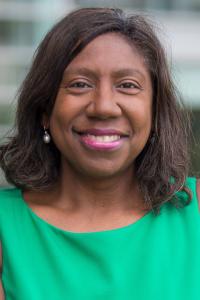
01 May USPSTF: New Guidelines Recommend All Women Get Screened for Breast Cancer Beginning at Age 40, Earlier if They Are at High Risk
MedicalResearch.com Interview with:

Dr. Nicholson
Wanda K. Nicholson, M.D., M.P.H., M.B.A.
Senior Associate Dean for Diversity, Equity, and Inclusion
Professor of Prevention and Community Health
Milken Institute School of Public Health
George Washington University
Dr. Nicholson was appointed chair of the U.S. Preventive Services Task Force in March 2024. She served as vice chair from March 2022 to March 2024 and as a member of the Task Force from January 2009 through December 2013.
MedicalResearch.com: What is the background for this study? What are the main findings?
Response: Breast cancer is the second most common cancer and the second most common cause of cancer deaths for women in the U.S. After reviewing the latest science, the Task Force recommends screening all women for breast cancer every other year starting at age 40 and continuing through age 74. This new approach has the potential to save nearly 20 percent more lives from breast cancer and has even greater potential benefit for Black women, who are much more likely to die from breast cancer.
MedicalResearch.com: What should readers take away from your report?
Response: Women deserve to have the best science available to guide them on how to protect their health and we are asking the research community to prioritize studies that can help answer outstanding questions around this screening. Specifically, we need to know how best to address health disparities across screening and treatment, especially for Black women. We also need studies on whether and how additional screening might help women with dense breasts stay healthy, and we need more evidence on the benefits and harms of screening women who are 75 and older.
MedicalResearch.com: What recommendations do you have for future research as a results of this study?
Response: Screening can prevent women from dying of breast cancer by finding the cancer when it is more treatable, so it’s critical all women get screened every other year starting at age 40. More women in their forties are getting breast cancer, with rates increasing about two percent each year. That means there is more potential benefit to screening for everyone, and there is even more potential benefit for Black women, so women should make sure they get screened starting when they turn 40.
MedicalResearch.com: Is there anything else you would like to add? Any disclosures?
Response: The science now more clearly shows that all women should start screening at age 40. This recommendation applies to cisgender women and other people assigned female at birth who are 40 years and older and at average risk of breast cancer. People with a family history of breast cancer and people who have other factors that increase their risk of breast cancer, such as dense breasts, are also included.
The Task Force’s recommendation does not apply to people who have a personal history of breast cancer, who are at very high risk of breast cancer due to certain genetic markers or a history of high-dose radiation therapy to their chest at a young age, or who have had a lesion on previous biopsies. These women should consult their healthcare professional for individualized guidance about screening.
Citation:
- US Preventive Services Task Force. Screening for Breast Cancer: US Preventive Services Task Force Recommendation Statement. Published online April 30, 2024. doi:10.1001/jama.2024.5534
- Trentham-Dietz A, Chapman CH, Jayasekera J, et al. Collaborative Modeling to Compare Different Breast Cancer Screening Strategies: A Decision Analysis for the US Preventive Services Task Force. Published online April 30, 2024. doi:10.1001/jama.2023.24766
- US Preventive Services Task Force. Screening for Breast Cancer. Published online April 30, 2024. doi:10.1001/jama.2024.5535 Patient Page
The information on MedicalResearch.com is provided for educational purposes only, and is in no way intended to diagnose, cure, or treat any medical or other condition.
Some links may be sponsored. Products are not endorsed.
Always seek the advice of your physician or other qualified health and ask your doctor any questions you may have regarding a medical condition. In addition to all other limitations and disclaimers in this agreement, service provider and its third party providers disclaim any liability or loss in connection with the content provided on this website.
Last Updated on May 1, 2024 by Marie Benz MD FAAD
